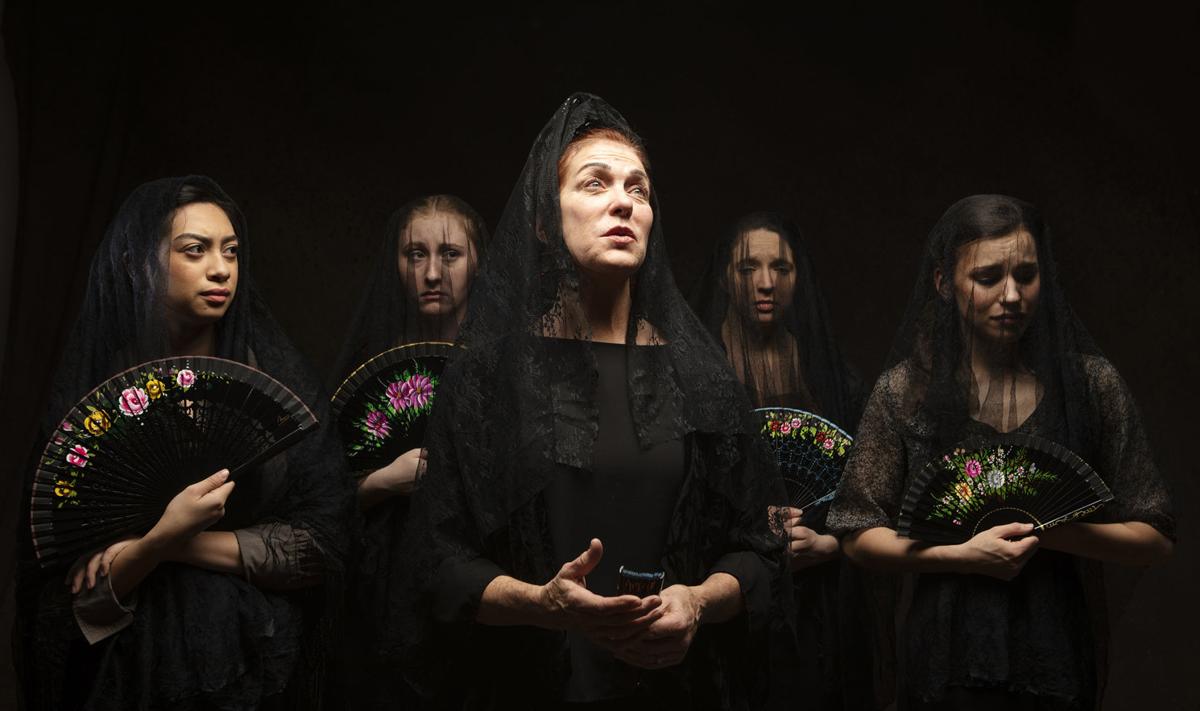As if the title wasn’t enough of a clue, the first scene makes it clear:
“Blood Wedding” does not end well.
The Federico García Lorca play, now at Scoundrel and Scamp Theater, opens as a mother laments the killing of her husband and a son.
“Knives, knives. Curse them all, and the wretch who invented them,” she says, eyeing the knife in her son’s hands.
Yeah, this is a tragedy.
The play is a brave one to take on — it has a large cast, it is wild with symbols, and two-thirds of the way in it takes on a surreal bent.
It’s basically a love story. The Bridegroom (Lorca names just one character in the play, which underscores these are types rather than individual characters) has met the woman he wants to marry. Bride is not terribly interested in marrying Bridegroom, but it is what her less-wealthy father insists on. Years before, she was betrothed to Leonardo, whom she still loves, and he her. Though he has a wife and child, he wears his horse out riding to Bride’s far-away home just to be near her.
On the wedding day, just after the ceremony, Bride and Leonardo run off together, leading to a bloody end.
Lorca wove several themes into the play, including fate, revenge, nature, life and death. The playwright had little use for the constraints of Spain’s society, and this piece, lyrically translated by Elizabeth Falcón, is a bit of a thumbing of the nose at that, as well.
Director Bryan Rafael Falcón incorporated 21 actors, including dancers and musicians who gave a rich flamenco flavor to the play.
And he put Susan Arnold in the important role of Mother of the Bridegroom. It’s a part that could easily go awry as the character can be over-the-top with her angst and anger. Arnold does not do over-the-top. She gave the Mother of the Bridegroom a deep sorrow, regal dignity and a powerful presence.
Also lending distinction was Nicole DelPrete, who breathed full life into the Wife of Leonardo, a tortured soul stuck in a loveless marriage.
Unfortunately, much of the cast did not reach the same levels. There was a lack of chemistry between Claire de la Vergne (Bride) and Jeffrey Baden (Leonardo), so it was hard to see a passion so feverish that they run off together.
Sean Cronin’s Bridegroom was difficult to read, which made it difficult to see his desire for Bride. And Adrian Encinas’ Moon was way too theatrical, even for a surreal character.
Still, there were many high points of the production, such as the wedding reception scene with attendees dancing flamenco, which felt organic and born of a joy of dancing — a precise, choreographed piece would not have felt so real. Adding a shadowy visual were the dancers, musicians and some characters behind a scrim at the back of the stage for much of the performance. At times it was a tableau, other times they moved slowly and rhythmically. It gave a deliciously foreboding sense.
And there was an audible gasp from the audience when Bride stepped on the stage dressed in a stunning, big-skirted black wedding gown.Marie Caprile did the costumes.
“Blood Wedding” has some shortcomings, sure, but this is Lorca, and Scoundrel & Scamp is a small theater brave and ambitious enough to stage such a demanding piece. Those are good reasons to see it.





